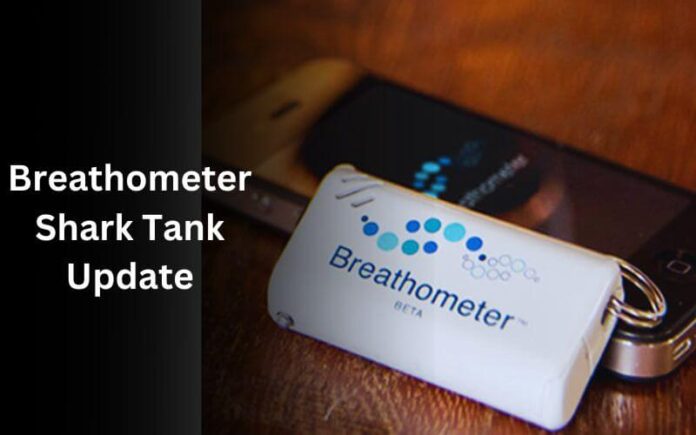In startups and entrepreneurship, few platforms have gained as much popularity and influence as Shark Tank. The show has catapulted many innovative products and ideas into the mainstream, offering aspiring entrepreneurs a chance to pitch their businesses to a panel of successful investors.
One such product that captured the attention of both the sharks and the audience was Breathometer, a portable smartphone breathalyzer invented by Charles Michael Yim. However, the story of Breathometer serves as a stark reminder of the challenges and pitfalls that come with starting and growing a business, even with the backing of prominent investors.
The Breathometer Pitch and Deal at Shark Tank
Charles Michael Yim, the founder of Breathometer, appeared on the first season of Shark Tank with an ambitious goal: to secure an investment of $250,000 in exchange for a 10% stake in his company. He pitched his product as a revolutionary device that could transform the way people monitor their alcohol consumption, promoting responsible drinking and potentially saving lives. The Breathometer was designed to plug into a smartphone’s headphone jack, allowing users to blow into it and instantly see their blood alcohol level displayed on the companion app.
Yim’s pitch impressed the sharks, and after some intense negotiation, he managed to strike a deal with all five investors – Mark Cuban, Lori Greiner, Robert Herjavec, Daymond John, and Kevin O’Leary. The sharks collectively invested $1 million in Breathometer, acquiring a 30% equity stake in the company. This massive investment and the backing of such prominent figures seemed to set Breathometer on a path to success.
Is Breathometer Still in Business?
Despite the initial hype and the substantial investment from the Shark Tank panel, Breathometer’s journey was far from smooth. In 2017, the Federal Trade Commission (FTC) investigated the device’s accuracy and found it to be “seriously inaccurate.”
The FTC ordered the company to offer full refunds to all its customers, effectively putting an end to Breathometer’s operations. As a result, Breathometer is no longer in business, and its website is no longer active.
What Was Breathometer’s Net Worth?
Prior to its appearance on Shark Tank, Breathometer had already gained some traction. Yim had successfully raised $50,000 of his own money and an additional $500,000 from angel investors.
Moreover, a crowdfunding campaign on Indiegogo yielded impressive results, with 4,000 devices sold and $140,000 in revenue generated within just 30 days. However, the company’s net worth took a significant hit following the FTC’s ruling, and the exact figure remains unknown.
Impact of Shark Tank on Breathometer
While appearing on Shark Tank undoubtedly gave Breathometer a significant boost in terms of exposure and investment, it also brought the company under intense scrutiny. The show’s popularity meant that Breathometer was now in the public eye, and any missteps or controversies would be amplified.
This became evident when a dispute arose between Yim and Mark Cuban, with the latter accusing the founder of misusing company funds for personal travel and entertainment. Although Yim refuted these claims, stating that his travels were business-related, the controversy cast a shadow over the company’s reputation.
Business Overview
The story of Breathometer highlights the challenges and risks involved in starting and running a business, even with the support of experienced investors. The product’s initial success and the backing of the Shark Tank panel were not enough to guarantee long-term viability, especially when faced with regulatory challenges and questions about the product’s accuracy. The dispute between Yim and Cuban also underscores the importance of maintaining transparency and trust between founders and investors.
Moreover, the reality of Shark Tank deals is often more complex than what is portrayed on television. A 2016 Forbes survey revealed that 73% of the deals made on the show do not materialize as planned, often due to changes in the business’s valuation, the discovery of new information, or disagreements between the parties involved. This serves as a reminder that securing an investment is only the beginning of a long and challenging journey for entrepreneurs.
Conclusion
The rise and fall of Breathometer offer valuable lessons for aspiring entrepreneurs and investors alike. While the backing of prominent figures and a successful crowdfunding campaign can provide a strong foundation, the long-term success of a business depends on various factors, including product quality, regulatory compliance, and the ability to navigate challenges and controversies.
The story also highlights the importance of due diligence and the need for entrepreneurs to be transparent and accountable to their investors. The dispute between Yim and Cuban serves as a cautionary tale about the potential pitfalls of misaligned expectations and communication breakdowns.
Ultimately, the Breathometer Shark Tank update is a reminder that entrepreneurship is a high-risk, high-reward endeavor. While the allure of securing a substantial investment and gaining national exposure is undeniable, founders must be prepared to face numerous obstacles and setbacks along the way. By learning from the experiences of others, both the successes and the failures, entrepreneurs can be better equipped to navigate the complex world of startups and build businesses that stand the test of time.
Also Read:
